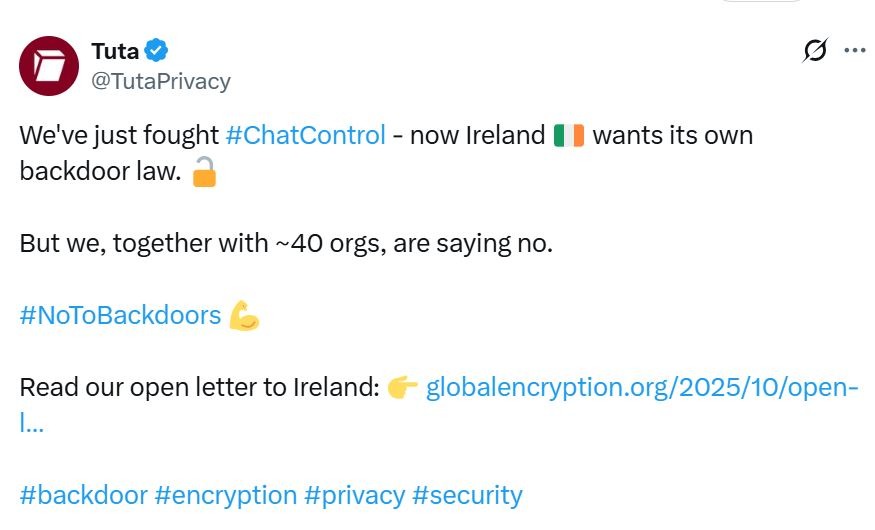Privacy Experts Warn Ireland Over Encryption and Chat Control Laws
A privacy coalition has urged the Irish government to abandon work on a pre-draft bill that would grant law enforcement access to encrypted messages.
Ryan Polk, an author at the Global Encryption Coalition (GEC), which advocates for and defends encryption worldwide, penned an open letter on Thursday, arguing that legislation proposed by Minister for Justice Jim O’Callaghan could lead to increased cybercrime and deter businesses from the country.
“Any country that undermines encryption risks threatening the privacy and security of people far beyond its borders. But Ireland, as host to the EU headquarters of major tech companies including Apple and Meta, bears particular responsibility,” he said.
The Communications, Interception and Lawful Access Bill is still in the works, with drafting yet to occur, according to Polk, but it’s expected to start in the next few months. The Global Encryption Coalition is calling for the legislation to be scuttled now.

The letter comes just days after a separate EU Chat Control bill, which aims to give authorities the ability to scan messages before they’re encrypted, was dealt a significant blow following Germany’s opposition to the bill.
The lobby group has also urged Ireland to withdraw its support for the Chat Control proposal, citing concerns over privacy and national security.
End of encryption is a national security risk
Polk argues that weakening encryption would make individuals and businesses more vulnerable to cybercrime, such as fraud and identity theft, as it’s a misconception that encryption can be weakened solely for “good guys” without also creating access pathways for bad actors.
At the same time, he noted that it would also make sensitive data more vulnerable to foreign cyberattacks and compromise national security.
“Encryption is a critical security feature; any deliberate weakening or circumvention of it creates systemic vulnerabilities that would endanger everyone and put Ireland’s national security at risk,” Polk added.
Ireland is also home to many of the world’s largest tech giants, drawn by the country’s location, which provides easier access to European and American markets, and its low corporate tax rates.
Polk said that platforms offering end-to-end encryption will face an impossible choice if the bill becomes law, having to either weaken the security of their services to comply or exit the Irish market altogether.
“In both cases, the result would be weaker security and reduced privacy for Irish citizens, businesses, and institutions that depend on encryption to maintain trust in the digital world, including Irish Government ministers and the gardaí themselves.”
EU Chat control, different beast, same problem
Along with scuttling the local legislation, the GEC is calling on the Irish government to withdraw its support for the EU’s Chat Control law, which would require messenger services to screen messages before they are encrypted and sent.
Related: Concordium debuts app for anonymous online age checks amid UK rules backlash
The head of Germany’s largest political party recently came out against the measure, which has thrown a spanner in the works.
Regardless, the GEC stated that Ireland could play a key role in shaping the future of the Chat Control proposal when it assumes the EU Council’s presidency in July 2026.
The coalition argues it’s essential that the government not “underestimate the grave consequences of weakening encryption – as evidenced by the current domestic proposal,” because the “privacy and security of all European citizens, and beyond, will be at risk.”
Magazine: Bitcoin’s invisible tug-of-war between suits and cypherpunks


